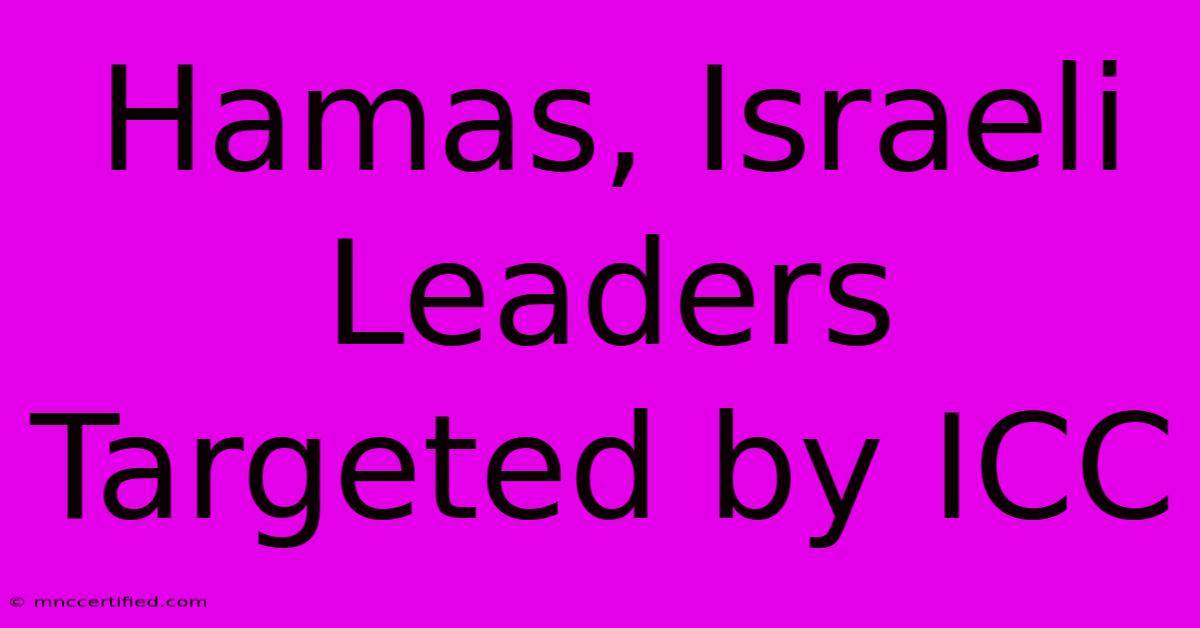Hamas, Israeli Leaders Targeted By ICC

Table of Contents
Hamas, Israeli Leaders Targeted by ICC: A Deep Dive into the International Criminal Court's Investigation
The International Criminal Court (ICC) has opened investigations into alleged war crimes and crimes against humanity committed in the context of the Israeli-Palestinian conflict. This complex situation involves accusations against both Hamas and Israeli leaders, sparking intense debate and raising crucial questions about international justice and accountability. This article delves into the ICC's investigation, exploring the key accusations, the legal framework involved, and the potential implications for peace in the region.
The ICC's Jurisdiction and the Palestine Situation
The ICC's jurisdiction is based on the Rome Statute, an international treaty establishing the court. Palestine, despite not being a full UN member state, accepted the court's jurisdiction in 2015, paving the way for the current investigations. This decision was met with strong opposition from Israel and the United States, who argue that the ICC lacks jurisdiction in this context. Understanding the nuances of this legal battle is crucial to comprehending the current investigations. The core argument revolves around whether Palestine constitutes a "State" under the Rome Statute.
Key Accusations Against Hamas
The ICC's investigation into Hamas focuses on alleged war crimes committed during the 2014 Gaza conflict. These accusations include:
- Targeting of civilians: Allegations center on indiscriminate attacks against civilian populations and infrastructure, including hospitals and schools. The use of human shields and the launching of rockets from populated areas are also key aspects of the accusations.
- War crimes related to weaponry: The investigation also examines the types of weaponry used and whether their deployment violated international humanitarian law. This includes assessing the proportionality of attacks and the precautions taken to minimize civilian casualties.
- Crimes against humanity: The potential for crimes against humanity charges hinges on whether the alleged actions were part of a widespread or systematic attack against a civilian population.
Key Accusations Against Israeli Leaders
The investigation into alleged crimes committed by Israeli leaders is equally complex and controversial. The ICC is examining accusations relating to:
- Disproportionate use of force: The ICC investigation is examining whether Israeli military operations during various conflicts, including the 2014 Gaza war, were disproportionate, resulting in excessive civilian casualties. The analysis includes assessing the military strategies employed and the impact on civilian areas.
- Siege of Gaza: The prolonged blockade of Gaza, its impact on the civilian population, and its potential qualification as a crime under international law are under scrutiny. This includes examining the impact on access to essential services like healthcare and food.
- Settlements and the wall: The legality of Israeli settlements in the occupied Palestinian territories and the construction of the separation barrier are also being considered within the context of war crimes and crimes against humanity. The investigation focuses on the impact of these actions on the Palestinian population.
The Challenges and Implications of the ICC Investigation
The ICC investigation faces numerous challenges, including:
- Political obstacles: The investigation has sparked significant political backlash from both Israel and its allies, who have accused the court of bias. This political pressure may impact the court's ability to conduct a fully independent investigation.
- Evidence gathering: Gathering sufficient and credible evidence to prove beyond a reasonable doubt the commission of war crimes and crimes against humanity is a significant hurdle. Access to witnesses and crime scenes can be restricted.
- Ensuring impartiality: Maintaining impartiality throughout the investigation is paramount to ensure the credibility and legitimacy of the proceedings. Perceptions of bias can significantly undermine the court's authority.
The implications of the investigation are far-reaching. A finding of guilt against either Hamas or Israeli leaders could have significant legal and political ramifications, potentially impacting ongoing peace negotiations and the broader geopolitical landscape. The outcomes will undoubtedly influence the future application of international law in armed conflicts and shape debates about accountability for human rights violations.
Conclusion: A Path Towards Accountability and Peace?
The ICC's investigation into alleged crimes committed by both Hamas and Israeli leaders is a complex and sensitive issue. While the pursuit of justice is crucial, the path towards accountability is fraught with challenges. The investigation’s outcome will significantly impact the prospects for peace and reconciliation in the region, underscoring the urgent need for a comprehensive and impartial approach to addressing the underlying causes of the conflict. The investigation serves as a reminder of the importance of international law in upholding human rights and ensuring accountability for atrocities committed during armed conflict. Only time will tell how this significant investigation will unfold and shape the future of international justice.

Thank you for visiting our website wich cover about Hamas, Israeli Leaders Targeted By ICC. We hope the information provided has been useful to you. Feel free to contact us if you have any questions or need further assistance. See you next time and dont miss to bookmark.
Featured Posts
-
Letter Of Credit Vs Surety Bond
Nov 22, 2024
-
Estrella Insurance 49 St Hialeah
Nov 22, 2024
-
National Treasures Trading Cards
Nov 22, 2024
-
Petes Regret A Strictly Love Triangle
Nov 22, 2024
-
Fgcus Sale Claims Cy Young
Nov 22, 2024